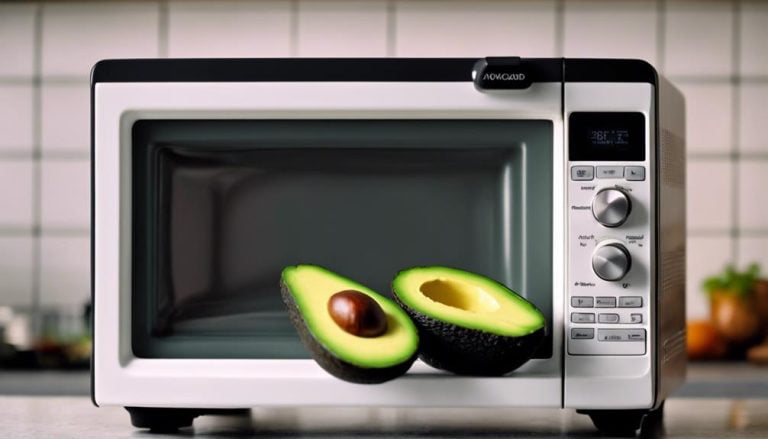Can You Microwave a Egg
Microwaving an egg can be done in various ways, such as scrambling it or poaching it in a microwave-safe dish. It's essential to pierce the egg yolk before microwaving to prevent it from exploding. Remember to cover the dish with a microwave-safe lid or plastic wrap to avoid any mess. Cooking times may vary depending on the microwave's power, so it's best to start with short intervals and check the egg's doneness regularly. Once cooked, handle the hot dish carefully to avoid burns.
It's important to note that microwaving eggs can cause them to explode if not done correctly. Always follow a reliable recipe or method to ensure safe cooking. Experimenting with different techniques and seasonings can help create delicious and quick microwave egg dishes. So, go ahead and give it a try for a convenient and speedy meal option.
Key Takeaways
- Yes, you can microwave eggs safely with proper precautions.
- Microwaving eggs retains nutrients and offers a quick breakfast solution.
- Use microwave-safe containers and follow cooking guidelines to prevent accidents.
- Ensure safe cooking practices for a convenient and nutritious meal option.
Safety of Microwaving Eggs
The safety of microwaving eggs is contingent upon utilizing appropriate containers and employing proper cooking techniques to mitigate potential hazards. When microwaving eggs, it is essential to use microwave-safe containers to prevent any adverse reactions. Piercing the yolks and whites before cooking is crucial to avoid explosions.
Following safety guidelines ensures a smooth cooking process and reduces the risk of accidents. Proper handling and cooking techniques are key to maximizing the retention of essential nutrients like protein and vitamins in microwaved eggs. By adhering to these precautions, microwaving eggs can be a safe and efficient cooking method that maintains the nutritional value of the food.
Benefits of Microwaved Eggs
Microwaved eggs offer a quick and efficient cooking method that retains nutrients effectively. This cooking technique is a convenient breakfast solution, saving time and energy for busy individuals.
Additionally, microwaved eggs can easily be personalized with a variety of ingredients to suit different tastes and preferences.
Quick Cooking Method
A rapid and efficient cooking technique, microwaving eggs offers numerous benefits for those seeking a quick and nutrient-rich meal option.
When you cook scrambled eggs in the microwave, you can significantly cut down on the time needed to prepare a fluffy and delicious meal. The microwave's quick cooking process ensures that the eggs are cooked evenly and without the risk of overcooking, resulting in a softer texture.
Retains Nutrients Efficiently
By utilizing the microwave for egg preparation, one can efficiently retain a significant amount of nutrients crucial for a healthy diet. When microwaving eggs, the quick cooking method helps preserve their nutritional value by minimizing exposure to heat.
Here are some key benefits of microwaved eggs:
- Retains More Nutrients: Compared to other cooking methods, microwaving eggs for a shorter duration helps retain more protein, vitamins, and minerals.
- Quick and Convenient: The microwave's even cooking process ensures that eggs are cooked quickly, making it a convenient option for busy individuals.
- Healthy Option: Microwaved eggs remain a healthy choice due to the preservation of essential nutrients during the cooking process.
- Efficient Cooking Times: Microwaving eggs maintains their nutritional content efficiently, providing a nutrient-rich meal in a short amount of time.
Risks of Microwaving Eggs

When considering the risks associated with microwaving eggs, it is crucial to be mindful of the potential for explosions due to rapid steam buildup in the shell. Overcooking eggs in the microwave can lead to a rubbery texture and loss of nutrients, posing a safety hazard.
To prevent explosions, it is essential to pierce the yolk and white of the egg before microwaving. Microwaving eggs for too long can cause them to burst, creating a mess and further increasing the risk of explosions.
Following proper microwave egg cooking techniques, such as monitoring cooking time and using appropriate power levels, can help mitigate these risks and ensure safe cooking practices. It is important to exercise caution when cooking eggs in the microwave to avoid potential hazards.
Health Considerations
When considering microwaving eggs, it is crucial to focus on health considerations such as the nutritional impact and food safety aspects.
Understanding how microwaving preserves nutrients and the importance of using microwave-safe containers can promote safe and healthy cooking practices.
Nutritional Impact
Microwaving eggs can enhance their nutritional value by preserving more nutrients compared to traditional cooking methods. When using the microwave for fluffy scrambled eggs, the process retains more nutrients, making it a convenient and efficient way to prepare a quick and nutritious meal. Here are some key points to consider regarding the nutritional impact of microwaving eggs:
- Retains more nutrients: Microwaving eggs helps in preserving essential nutrients like vitamins and minerals better than other cooking methods.
- Convenient and efficient: Using the microwave for cooking eggs is a quick and efficient method, saving time and energy.
- Healthy and nutritious: Microwaved eggs are as healthy and nutritious as eggs cooked using conventional methods.
- Proper containers: It is essential to use microwave-safe containers when cooking eggs to ensure safety and prevent any harmful chemicals from leaching into the food.
Food Safety
Considering health considerations, ensuring proper food safety when microwaving eggs is paramount for maintaining a safe and nutritious meal preparation process.
Microwaved eggs are safe to consume when using microwave-safe containers and avoiding un-pierced shells to prevent explosions. This cooking method retains nutrients well, making microwaved eggs a convenient and healthy option.
Following recommended cooking times and handling procedures is crucial to minimize health risks associated with microwaving eggs. By using appropriate containers and safe handling practices, microwaved eggs can offer a quick and efficient way to enjoy a nutritious meal.
It is essential to prioritize food safety when preparing microwaved eggs to reap the benefits of this convenient cooking method while maintaining optimal health.
How to Poach Eggs in Microwave

To poach eggs effectively in the microwave, crack an egg into a microwave-safe bowl filled with water and a splash of vinegar. Follow these steps for a quick and easy poached egg:
- Cover the bowl: Place a plate on top of the bowl to create a steamy environment for the egg to cook evenly.
- Microwave: Cook the egg on high for about 30 seconds, adjusting the time based on your desired yolk consistency.
- Season: Sprinkle the poached egg with salt and pepper to enhance its flavor before serving.
- Enjoy: Indulge in a perfectly poached egg with a runny yolk, a simple yet delicious addition to your breakfast or any meal.
Scrambled Eggs in the Microwave
Efficiently creating scrambled eggs in the microwave offers a convenient and quick breakfast option for busy mornings. To make microwave scrambled eggs, whisk eggs with milk or water and a pinch of salt in a microwave-safe dish. Cook on high power for short intervals, stirring in between, until the eggs reach the desired consistency. This hands-off method requires minimal effort and is perfect for those on the go.
For added flavor, consider mixing in cheese or vegetables during the cooking process. Cheesy scrambled eggs can be a delicious twist to the classic breakfast dish. With the microwave, you can have a satisfying meal ready in just a matter of minutes, making it an ideal choice for a speedy morning routine.
Making Omelets in the Microwave

Utilizing a microwave-safe dish, quickly create a customized omelet in just a few minutes, ideal for hectic mornings when time is of the essence.
- Prepare your ingredients such as cheese, vegetables, or meats for a customizable omelet.
- Beat eggs and add seasonings in a microwave-safe dish.
- Cook the omelet in the microwave for around 2-3 minutes until fluffy and fully set.
- Enjoy a hassle-free and delicious microwave omelet without the need for a stovetop.
Making omelets in the microwave is not only quick and convenient but also allows for a variety of options to suit your taste preferences. This method provides a simple and efficient way to enjoy a satisfying breakfast without the usual fuss.
Microwaving Hard-Boiled Eggs
When looking to prepare hard-boiled eggs using a microwave, it's important to note that microwaving eggs in their shells can lead to messy explosions. Instead of using the traditional method that takes around 20 minutes on the stovetop, consider steaming the eggs for easier peeling and quicker cooking.
To microwave hard-boiled eggs safely, crack the eggs into a microwave-safe bowl, cover it, and microwave on high for about 40-50 seconds per egg. Alternatively, using an egg cooker can provide faster and more convenient results.
Avoid attempting to make soft-boiled eggs in the microwave, as it may result in a messy outcome and uneven cooking.
Frequently Asked Questions
Can Microwaving Eggs Cause Them to Explode?
Egg safety in microwaving is crucial to avoid explosions. Proper microwave precautions include piercing eggs before heating to release steam pressure. Temperature control is essential to prevent food explosions. Following these cooking techniques ensures kitchen safety and dispels egg myths.
Is It Safe to Microwave Eggs in Their Shell?
Cooking methods evolve like a symphony, blending tradition with innovation. Egg safety is paramount; avoid microwave myths by cracking eggs into microwave-safe dishes for controlled cooking. Explore recipe options for culinary creativity and safe kitchen experiments.
Can Microwaving Eggs Cause Them to Become Rubbery or Tough?
Texture changes in microwaved eggs can result from overcooking risks due to prolonged cooking times. To prevent rubbery or tough textures, adjust microwave settings, consider egg size, incorporate stirring techniques, and monitor cooking time diligently to maintain flavor and texture integrity.
Are There Any Specific Health Risks Associated With Microwaving Eggs?
While microwaving eggs is generally safe, there are potential health risks to consider. Overcooking may lead to nutrient loss and protein denaturation. Cholesterol oxidation, vitamin loss, and allergic reactions pose food safety implications, highlighting the importance of proper cooking techniques.
Can Microwaving Eggs Affect Their Nutritional Value?
Nutritional changes in eggs during microwaving can occur due to protein denaturation from heat exposure. Proper cooking methods are crucial to preserving egg quality and nutrients. Microwaving benefits include quick cooking, but temperature impact must be monitored for optimal results.
Conclusion
In conclusion, microwaving eggs is a safe and convenient way to cook them.
While there are benefits to microwaving eggs, such as saving time and reducing the need for additional cooking tools, there are also risks to consider, such as the potential for uneven cooking.
One interesting statistic is that a study found that microwaving eggs can retain more nutrients compared to other cooking methods, making it a healthy option for quick and easy egg preparation.






